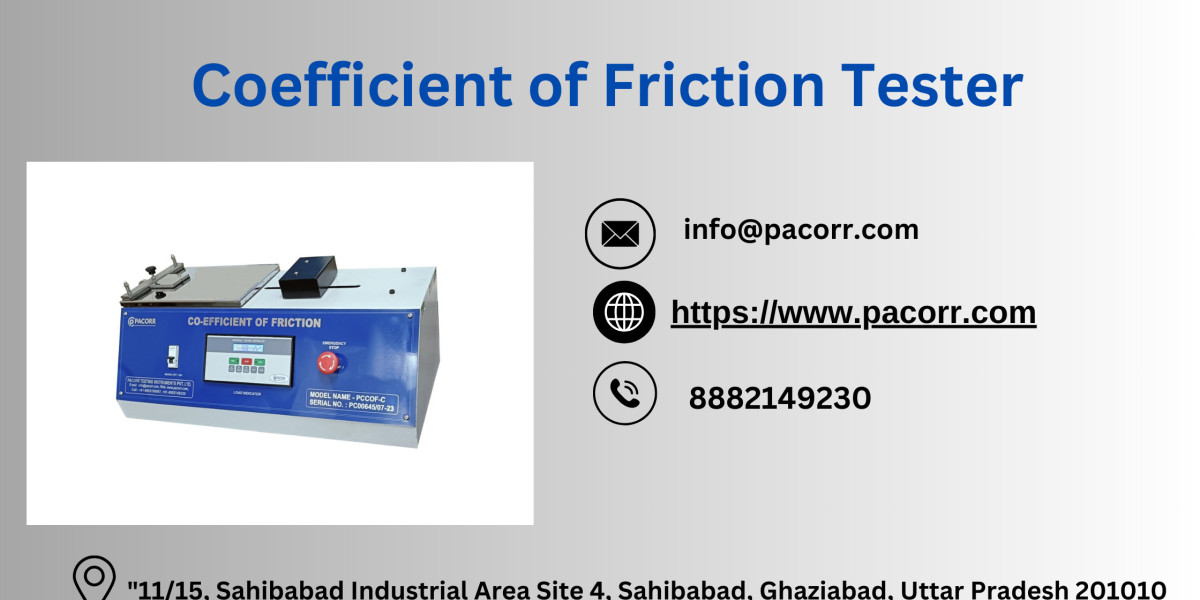Introduction
In the realm of material testing, understanding the frictional properties of materials is paramount. The Coefficient of Friction (COF) Tester is an essential instrument in various industries, providing critical insights into the slip properties of materials. This device helps manufacturers ensure quality, safety, and compliance with international standards.
What is a Coefficient of Friction Tester?
A Coefficient of Friction Tester measures the frictional forces between two surfaces. The coefficient of friction is a dimensionless value that represents the ratio of the force of friction between two bodies to the force pressing them together. There are two primary types of friction measured: static friction (the force required to initiate movement) and kinetic friction (the force required to maintain movement). Understanding these values is crucial for industries where material interaction plays a significant role, such as packaging, automotive, textiles, and consumer goods.
Importance of Measuring Coefficient of Friction
1. Safety: In industries like packaging and textiles, slip properties are critical for safety. For instance, in packaging, ensuring that materials do not slip too easily prevents accidents during handling and transport.
2. Quality Control: Consistency in frictional properties is essential for maintaining product quality. Variations in friction can lead to defects or failures in the final product.
3. Compliance: Many industries must comply with international standards that specify acceptable ranges for frictional properties. A COF Tester ensures that materials meet these regulatory requirements.
4. Performance Optimization: Understanding frictional properties can help in optimizing the performance of materials. For example, in the automotive industry, the right frictional balance can enhance tire performance and longevity.
Key Features of the Pacorr Coefficient of Friction Tester
Pacorr's Coefficient of Friction Tester is designed to provide accurate and reliable measurements. Here are some key features that make it a valuable tool for material testing:
1. High Precision Sensors: The tester is equipped with high-precision sensors that ensure accurate measurement of both static and kinetic friction.
2. User-Friendly Interface: The device comes with an intuitive interface that allows for easy operation and data recording. This ensures that users can efficiently perform tests without extensive training.
3. Versatile Testing Capabilities: The tester can accommodate a wide range of materials, including films, sheets, papers, textiles, and more. This versatility makes it suitable for various industries.
4. Robust Construction: Built with durable materials, the tester is designed to withstand rigorous use, ensuring long-term reliability and minimal maintenance.
5. Data Analysis Software: The included software provides comprehensive data analysis capabilities. Users can generate detailed reports, track trends, and ensure compliance with industry standards.
Applications of Coefficient of Friction Tester
The COF Tester has broad applications across different industries:
1. Packaging Industry: In the packaging industry, the COF Tester helps in evaluating the slip properties of packaging materials like films and foils. This ensures that products are securely packaged and transported without risk of slippage.
2. Textile Industry: For textiles, the tester evaluates the frictional properties of fabrics, which is crucial for ensuring comfort and durability. It helps in the development of fabrics with desired slip characteristics.
3. Automotive Industry: In the automotive sector, the tester is used to measure the frictional properties of tires and other components. This information is vital for optimizing performance and safety.
4. Consumer Goods: For consumer goods, the tester ensures that products like shoes, gloves, and other items have the appropriate frictional properties for their intended use.
5. Construction Materials: In construction, materials like tiles and flooring are tested for their slip properties to ensure safety and compliance with building standards.
Benefits of Using Pacorr Coefficient of Friction Tester
1. Enhanced Product Quality: By accurately measuring and controlling the frictional properties of materials, manufacturers can ensure high-quality products that meet customer expectations.
2. Improved Safety: Accurate COF measurements help in designing safer products and packaging, reducing the risk of accidents and injuries.
3. Regulatory Compliance: The tester ensures that materials comply with international standards, facilitating smoother market entry and reducing the risk of non-compliance penalties.
4. Cost Efficiency: By identifying and addressing friction-related issues early in the production process, manufacturers can reduce waste and avoid costly recalls or product failures.
5. Innovation and Development: The tester aids in the development of new materials and products by providing critical data on frictional properties, fostering innovation and competitive advantage.
Conclusion
The Coefficient of Friction Tester is an indispensable tool in the arsenal of material testing instruments. Its ability to provide accurate and reliable measurements of frictional properties makes it essential for ensuring product quality, safety, and compliance across various industries. Pacorr's Coefficient of Friction Tester Price stands out with its high precision, user-friendly interface, versatility, robust construction, and comprehensive data analysis capabilities. By incorporating this device into their testing protocols, manufacturers can achieve significant improvements in product performance, safety, and marketability.
Frequently Asked Questions (FAQ) about Coefficient of Friction Tester
Q1: What is the Coefficient of Friction?
A1: The Coefficient of Friction (COF) is a dimensionless value that represents the ratio of the force of friction between two bodies to the force pressing them together. It is a critical parameter in understanding the slip properties of materials.
Q2: Why is measuring the Coefficient of Friction important?
A2: Measuring the COF is important for ensuring product safety, quality control, regulatory compliance, and performance optimization. It helps in understanding how materials will behave in real-world applications.
Q3: What industries benefit from using a Coefficient of Friction Tester?
A3: Various industries benefit from using a COF Tester, including packaging, textiles, automotive, consumer goods, and construction materials.
Q4: How does Pacorr's Coefficient of Friction Tester ensure accuracy?
A4: Pacorr's COF Tester is equipped with high-precision sensors and robust data analysis software, ensuring accurate measurement and reliable results.
Q5: Can the Coefficient of Friction Tester accommodate different materials?
A5: Yes, the tester is versatile and can accommodate a wide range of materials, including films, sheets, papers, textiles, and more.
Q6: How does the COF Tester contribute to safety in product design?
A6: By accurately measuring frictional properties, the COF Tester helps in designing products with appropriate slip characteristics, reducing the risk of accidents and ensuring user safety.
Q7: What features make Pacorr's Coefficient of Friction Tester user-friendly?
A7: The tester features a user-friendly interface, intuitive operation, and comprehensive data analysis capabilities, making it easy for users to perform tests and analyze results.
Q8: How does the COF Tester aid in regulatory compliance?
A8: The tester ensures that materials meet international standards for frictional properties, helping manufacturers comply with regulatory requirements and avoid penalties.
Q9: What is the difference between static and kinetic friction?
A9: Static friction is the force required to initiate movement between two surfaces, while kinetic friction is the force required to maintain movement. Both are measured by the COF Tester.
Q10: How can the COF Tester improve product development?
A10: By providing critical data on frictional properties, the COF Tester aids in the development of new materials and products, fostering innovation and competitive advantage.
For more information on the Coefficient of Friction Tester and other material testing solutions, visit Pacorr Testing Instruments








